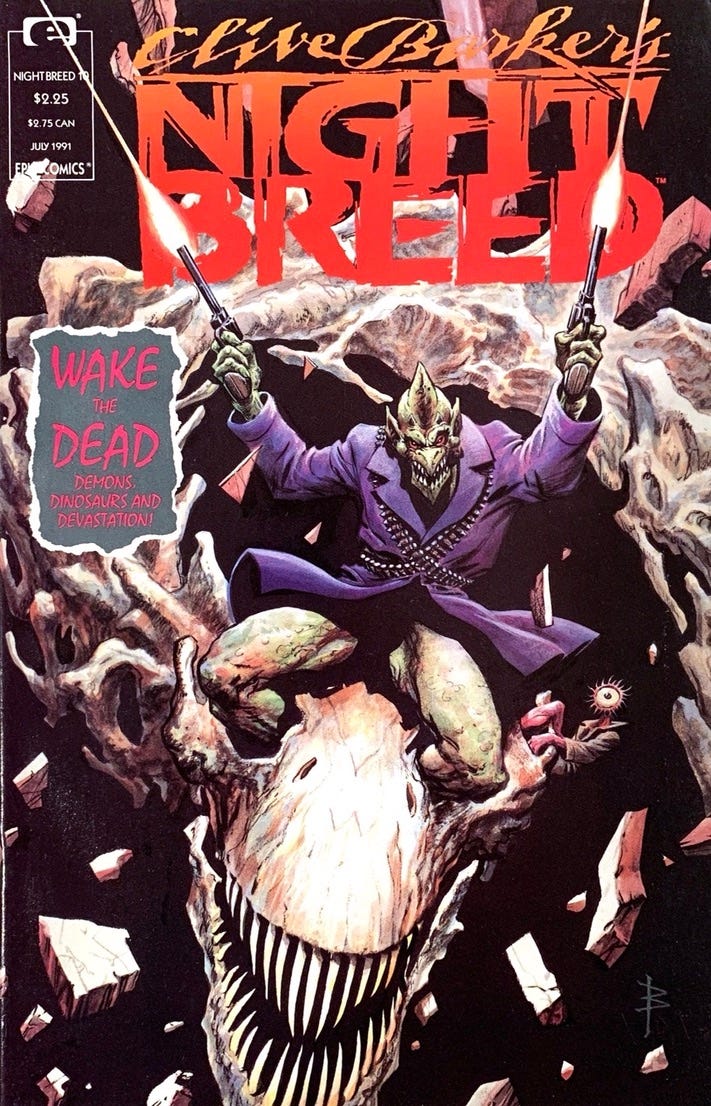With Into the Storymaze you get writing ideas or writing-in-progress; something creative I’m excited to share; a highlight from my comic book writing; and a quote that’s worth a think.
I usually like to pace out the “Street Writers” — selections from my now extinct but still distinct podcast with Mark Bellusci. But I’ve had this one queued up for a bit, and something special and sequential planned for the next few weeks after…so here we are again so soon, mic-ed up on writing inspo.
Dan: What are you going to write about? The image prompt makes it easy. The interwebs are chock full of visuals. Right on Google, you could do an image search on a topic or just play image roulette. Flicker has tons of different image libraries, as well as Pinterest.
You find that image. Just find an image there. Just pick one at random, don't even look for the one that necessarily inspires you, but pick it and challenge yourself what's going on in that image. What happened right before it? What happens next? Who's that person standing there next to that building? Why is that expression on that kid's face?
Everything that you see is a moment in time that you as a writer can then build those extra moments around. Leading into the moment, leading off the moment…there’s so much inspiration out there for us if we are only receptive to it and open to it.
Mark: I'll go further here because I love that, especially as a starting point for a new idea and stuff. Go through the Times, Esquire magazine, go through anything that you see online and just let it go. Go on social media, wherever you want to go.
I also found it's a great help if not getting you started in a story, then helping you flesh out stuff that maybe you're not so good at.
The great example for me is, somebody walks in a room and it's, “Well, what does that room look like?” Description is always a challenge for me, if I'm writing a short story, So maybe you're at somebody's house or maybe you're at a library or something…maybe you see a room and you say, “Wow, look at the way the light hits that couch.”
If you're seeing it, it's a lot easier to bring it to life. They say a picture's worth a thousand words. Well, okay: there's the picture, start putting the thousand words together.
Dan: I'll plus that one more. As you’re saying, sometimes you're in the middle of something, the story and you hit a wall. “I don't know where to go with this. I don't know what to do. I don't know what's supposed to happen next.”
Maybe that image becomes your what's next. You find that image of some guy playing a flute while he's wearing lederhosen in the middle of a snow storm.
And you suddenly introduce that guy into right into the engine, too. It doesn't make “sense.” Maybe it's not logical. But sometimes that randomizer effect gets you out of the situation that you're in, or takes you into a really new direction that you weren't expecting.
Mark: I see your bet and I raise you.
Dan: You're having too much fun now.
Mark: I've always felt that I'm more of a verbal word guy than a visual guy. And I always work on trying to get my visual metaphors stronger, either in films or plays or scripts.
Your phone's got a great camera. I've learned a lot about visual just by pulling the damn thing out and seeing stuff through the camera lens, or seeing it there in the shot after I take a picture that I never saw before taking it.
So, you could be in a parking lot watching people. And then you see two interesting people passing: take a shot. Don't get caught, but take the shot.
Now you have characters. Now you have the relationship between those two people who are just passing. But what if one spilled coffee on the other one, if one smiled at the other?
Dan: We always talk about words, but what we're doing with those words is we're creating images in readers' heads anyway. So why not? Why not grab the image to help us create the words and just reverse engineer that direction?
Mark: You've given me a clear picture on this topic then.
Dan: You're on fire. All right, let's get outta here.
I tend to pull from more obscure sources for this treasures section. But the Storymaze goes where the Storymaze goes — and sometimes that leads to a higher profile project, as in the new Netflix series, Guillermo del Toro's Cabinet of Curiosities.
del Toro, of course, is the Oscar winning director of Pan's Labyrinth, The Shape of Water and the hugely enjoyable Hellboy movies with Ron Perlman. Cabinet of Curiosities is his version of Rod Serling's Night Gallery — with a lot more curated control. (Serling, sadly, lent little more than his name and intros to that earlier TV anthology.) A phantasmagoric collection of oddities are Guillermo's muses as he intros this set of 8 tales of horror. del Toro is up front in giving credit to each director, and each lends a distinct style to the terror that unfolds.
Pickman's Model is a note-perfect period piece of art-inspired madness; The Autopsy turns-the-tables on alien invasion, with the fabulous F. Murray Abraham leading the defense of humanity; The Viewing channels seventies-style drippiness as a platform for a rich (and richly disturbing) Peter Weller to host mind and body games in his disturbing mansion; and The Murmuring delivers a very Shirley Jackson ghost story vibe — and a level of unexpected sweetness. (Plus you get to see The Walking Dead’s Andrew Lincoln acting beyond killing zombies and shouting, “Caaarl!”)
Like all anthologies you'll find some more to your liking than others. But I had a blast bingeing — especially late at night.
The production level is high, and the tentacled monstrosities at play particularly gruesome. (Fans of H.P. Lovecraft's other dimensional horrors will find a particular thrill in some choice visualizations of that author's typically "indescribable" evil.) It's not for the faint of heart — but fans of del Toro's style and sensibilities will find much to celebrate. And shudder about.
Concluding this serial replay of the afterword to BOOM Studio’s marvelous Nightbreed collection. Featuring quotes from editors Marcus McLaurin and Gregory Wright…
PEELING BACK THE SKIN
As a rule, I almost never re-read my work; fearful, perhaps, that it might seem like I’ve returned to the scene of a crime. I might give myself credit for a clever line or scene, but it’s rare I’ll revisit a full issue. Until an unexpected email from Alex Galer (editor on this no doubt excellent collection you’re now holding), and his wonderful invitation to write the foreword and this afterword, necessitated a look back at these issues.
I cringed at one too many references to H.P. Lovecraft. I questioned my over reliance on “EC Comics” style captions and “clever” turns of phrase. But as I turned the pages — maybe for the first time — something crazy-cool happened.
I was shocked at poor Spider-Baby’s sudden 18 wheel massacre. I felt bad for Dagon’s blindness — and worse that I was the one who took his eyes. I was nerdish little Mulciber, seeking craft and approval through his monster model kits; and introverted Oral, who can’t voice the words to win over the beloved so nearby.
I wanted to cackle like Nickneven, rave like Peloquin, have a cause like Kinski. Oh to be Pinhead, cooly adjusting his pins and dolling out withering contempt to all those less…disciplined. At the risk of sounding pleased with myself and my word slinging — what a ride!
Greg has his own autopsy. “I would have liked to have artists finish off their story arcs themselves. Unfortunately artists usually had another job or two that took priority over this title because the other books they worked on generated royalty payments for them. This meant we had to use more than one artist to finish off some stories.”
“They straddled a very dangerous line,” considers Marcus. “Nightbreed came out on the cusp of a period where comics were no longer being considered exclusively for kids — which was for the good, as many of the themes in Clive Barker’s work are decidedly not for the kiddies. But this was what I (and assumedly a lot of the fans) liked most about the concept and the series.
“Understanding that comics are a medium, not a genre, and so should be open to telling any kind of story, and one that was relatively new to the American audience. And within that paradigm, the Nightbreed stories staked a unique claim with the type of story it was determined to tell.
“With this mindset, there were many things that I wasn’t sure we would ‘get away with,’ in the halls of a comic book company that had racks in the halls screaming ‘Hey kids! Comics!’ These stories relied on timeless elements of loyalty, humanity, and storytelling devices like shock and suspense, but above all strong, memorable, even noble if horrific, characters. And they were stories that stuck with you.”
EPITAPH
“I was proud that we created material that Clive felt was worthy of his world,” reflects Greg. Amen to that.
I was 25 when I wrote Nightbreed. 25?!? Impossibly old to some readers of this ramble. Impossibly young to this rambling writer. Almost impossible to imagine the “so much” I was part of in so short a time.
Partying with “monsters” (the delightful Doug “Pinhead” Bradley and Nick “Chatterer/Kinski” Vance). Jetting to the Nightbreed movie set. Interviewed by countless horror mags. Visiting with the famous auteur at his homes in London and Hollywood, and hanging together at his autograph sessions. Invited to play screenwriter on aborted film productions of Weaveworld and the Clive-spired Primal. And of course being entrusted with the midnight exploits of Cabal and company.
I never took it for granted or as any kind of “due”. But I’m not sure I appreciated it in full, either. When so much is still ahead of you — not all of which will go according to plan! — it’s hard to have the long view. Let me then offer this wisdom, even if it’s come late.
If by chance or design you find yourself in another's world — by invitation, muse, or relationship — that’s a precious gift. Treat it well. Care — deeply — for its citizens. At the same time, don’t neglect to take advantage of this rare circumstance. Enjoy its bounty. Relish its secrets. Explore its moist corners. Invest yourself in it. For, like the Nightbreed’s city of Midian, its time will not last.
Or, most certainly, your time there will not.
So be sure and leave something good of yourself behind. And honor its gods. Which, in the end, is all that remains to be said:
Thank you, Clive.
“Leap, and the net will appear.” — Julia Cameron
Amazing Times
I’m D.G. Chichester. If that looks pretentious, feel free to just call me “Dan.”
I earned my storytelling cred writing comic book titles like Daredevil, Terror Inc., Nick Fury Agent of SHIELD and Clive Barker’s Hellraiser, along with digital widgets in the world wide web of advertising. I like weird tales, so if things here bend that way — now you know why!
Folks seem to like the comic book adventures I’ve written, so if you haven’t checked one out — please do. Many are now available in fab collected editions.
For the eager moments between newsletters…
@dgchichester — 280 characters from the Twitterverse
@dgchichester — images via Instagramland












